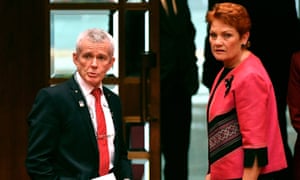Extract from The Guardian
One Nation senator Malcolm Roberts
was “choosing to believe he was never British” according to reports
after a tweet has surfaced contradicting one of his previous claims.
The case of the senator’s citizenship is getting curiouser and curiouser in a week in which dual citizenship claimed its third victim in the federal parliament – the resources minister Matt Canavan.
Since Roberts’ election in July 2016, questions over dual citizenship have been raised given its potential to render him ineligible to sit as a Australian senator under section 44 of the constitution.
On 25 October last year, a spokesman for Roberts told Guardian Australia’s Katharine Murphy that he was born in India to expatriate parents, but had only ever held one citizenship.
“Senator Roberts has never held any other citizenship other than his Australian citizenship,” the spokesman said at the time.
“He’s had to obtain visas when he’s travelled to the United Kingdom
and to India, and people who are citizens do not have to get visas.”
The matter sat there until this month when Greens senators Scott Ludlam and Larissa Waters resigned after they discovered they were dual citizens of New Zealand and Canada respectively.
This forced the spotlight back on to Roberts and the other 24 MPs who were born overseas. Roberts again maintained he had checked with Indian authorities and he was clearly only a citizen of Australia.
Last weekend the Australian reported that Roberts was on the General Register Office’s register of British nationals born overseas 1818-2005, suggesting he also had British citizenship.
By way of proof, he signed a statutory declaration which in part stated: “I can confirm I am not a citizen of The United Kingdom, nor am I a citizen of India. I am a citizen of Australia only.”
Less than a week later, Buzzfeed published documents purporting to show Roberts had travelled on a British passport as a child.
Then his story changed, when his spokesman said that Roberts had renounced any citizenship on 6 June three days before nominations closed for the 2016 election.
Asked how that squared with his previous statement to Murphy, Black alleged he was misquoted.
“The Guardian, as always, is most likely wrong,” Black told various media outlets. “They always publish nonsense and I have told them as much today.”
On Thursday, Fairfax unearthed a tweet which was sent the day after Murphy’s story in which Roberts echoed his spokesman.
But his spokesman told Fairfax, it was no contradiction.
“He is choosing to believe that he was never British. He is preferring to believe that he was never British because he has no allegiance or exercised any citizenship arrangement. However they have renounced and released him of anything to do with them,” the spokesman said.
“There is nothing wrong or incongruent with Malcolm Roberts putting his hand up and saying as far as I’m concerned I’m not British, never was – the British government may have a different view.”
Guardian Australia sought comment from Roberts’ office regarding the latest development.
The case of the senator’s citizenship is getting curiouser and curiouser in a week in which dual citizenship claimed its third victim in the federal parliament – the resources minister Matt Canavan.
Since Roberts’ election in July 2016, questions over dual citizenship have been raised given its potential to render him ineligible to sit as a Australian senator under section 44 of the constitution.
On 25 October last year, a spokesman for Roberts told Guardian Australia’s Katharine Murphy that he was born in India to expatriate parents, but had only ever held one citizenship.
“Senator Roberts has never held any other citizenship other than his Australian citizenship,” the spokesman said at the time.
The matter sat there until this month when Greens senators Scott Ludlam and Larissa Waters resigned after they discovered they were dual citizens of New Zealand and Canada respectively.
This forced the spotlight back on to Roberts and the other 24 MPs who were born overseas. Roberts again maintained he had checked with Indian authorities and he was clearly only a citizen of Australia.
Last weekend the Australian reported that Roberts was on the General Register Office’s register of British nationals born overseas 1818-2005, suggesting he also had British citizenship.
By way of proof, he signed a statutory declaration which in part stated: “I can confirm I am not a citizen of The United Kingdom, nor am I a citizen of India. I am a citizen of Australia only.”
Less than a week later, Buzzfeed published documents purporting to show Roberts had travelled on a British passport as a child.
Then his story changed, when his spokesman said that Roberts had renounced any citizenship on 6 June three days before nominations closed for the 2016 election.
Asked how that squared with his previous statement to Murphy, Black alleged he was misquoted.
“The Guardian, as always, is most likely wrong,” Black told various media outlets. “They always publish nonsense and I have told them as much today.”
On Thursday, Fairfax unearthed a tweet which was sent the day after Murphy’s story in which Roberts echoed his spokesman.
I have never held any citizenship other than Australian. When I travelled to UK & India I require a visa
But his spokesman told Fairfax, it was no contradiction.
“He is choosing to believe that he was never British. He is preferring to believe that he was never British because he has no allegiance or exercised any citizenship arrangement. However they have renounced and released him of anything to do with them,” the spokesman said.
“There is nothing wrong or incongruent with Malcolm Roberts putting his hand up and saying as far as I’m concerned I’m not British, never was – the British government may have a different view.”
Guardian Australia sought comment from Roberts’ office regarding the latest development.

No comments:
Post a Comment